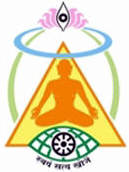
Arham
The practice of Preksha Meditation begins with the auspicious recitation of 'Arham'. It is a powerful mantra that helps to stimulate our vital energy.
Man is highly influenced by external forces. The most effective ways to influence our vital power is sound vibrations. Since sounds have different wavelengths, their effects are also dissimilar. Whenever we speak we produce different sound vibrations. However, we hardly try to identify the source as to where from these spoken letters originate? There are different places of articulation in our body, e.g. the articulation of 'Arham' is as under:
'A' is pronounced from the throat
'R' from the cerebrum in the brain
'Ha' from the larynx
'M' from the lips
- When we pronounce 'A' our center of purity, the location of the thyroid gland gets activated, which controls the metabolism of the body. The secretions of this gland influence both the mind and the body.
- Pronunciation of 'rha' stimulates the frontal lobe of the brain, the center of peace. It is also the location of the hypothalamus. It forms the central point the subtle body and the gross body.
- When one pronunces'm' the lips gets closed. Its sound stimulates the entire brain.
The vibrations issued from rhythmic recitation are powerful enough to awaken various centers of consciousness and rekindle pran shakti (the vital energy).
In other words, we can say that the rhythmic recitation of the mantra 'Arham' can be extremely helpful. It alleviates our tension and stress and creates an atmosphere of peace and harmony.
 Sadhvi Vishrut Vibha
Sadhvi Vishrut Vibha

